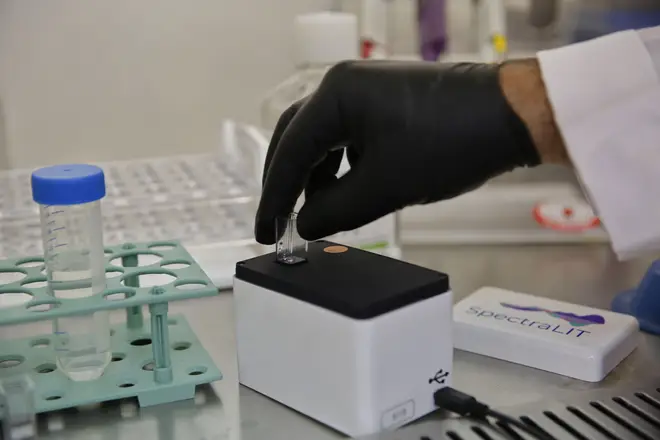
Iain Dale 7pm - 10pm
29 August 2020, 00:00 | Updated: 25 July 2023, 11:53

Artificial intelligence capable of spotting deadly diseases like cancer is to receive a £50 million funding boost in a bid to speed up diagnosis times.
The extra money is being awarded to three specialist centres based in Coventry, Leeds and London, delivering digital upgrades to pathology and imaging services across an additional 38 NHS trusts, the Department of Health and Social Care (DoH) said.
It is hoped the technology will improve outcomes for millions of patients, providing a more accurate diagnosis and freeing up NHS staff time, as part of a Government commitment to detect three quarters of cancers at an early stage by 2028.
Health Secretary Matt Hancock said: "Technology is a force for good in our fight against the deadliest diseases - it can transform and save lives through faster diagnosis, free up clinicians to spend time with their patients and make every pound in the NHS go further.
"I am determined we do all we can to save lives by spotting cancer sooner.
"Bringing the benefits of artificial intelligence to the front line of our health service with this funding is another step in that mission.
"We can support doctors to improve the care we provide and make Britain a world-leader in this field.
"The NHS is open and I urge anyone who suspects they have symptoms to book an appointment with their GP as soon as possible to benefit from our excellent diagnostics and treatments."

Nick Ferrari asks Matt Hancock if £13 will make people self-isolate
The Government said the investment will support its long-term response to Covid-19, allowing centres to work with British businesses and thereby support the economic recovery.
The DoH said that since the beginning of the coronavirus pandemic, more than 92% of urgent cancer referrals have been investigated within two weeks and 85,000 people have started treatment.
Darren Treanor, a consultant pathologist at Leeds Teaching Hospitals NHS Trust and director of one of the three centres, said: "This investment will allow us to use digital pathology to diagnose cancer at 21 NHS trusts in the North, serving a population of six million people.
"We will also build a national network spanning another 25 hospitals in England, allowing doctors to get expert second opinions in rare cancers, such as childhood tumours, more rapidly."

Former Health Secretary: New body has same problems as PHE
It comes as the Government said it hopes to clear the backlog of cancer patients awaiting treatment "within a matter of months".
Official figures have shown a dip in cancer referrals in England, while one charity said there has also been a decrease in the numbers or patients being treated with radiotherapy.
Speaking to ITV News, Matt Hancock said the number of cancer patients waiting longer than 62 days - the standard the Government wants to see - has increased "substantially", but that the numbers have "more or less halved" since the peak of the pandemic.
He said: "We've had to take action right across the NHS to make sure that we deal with Covid, and it was very important when there were a lot of new cases of Covid that people weren't made more at risk because of treatments, especially for cancer.
"But now it's incredibly important for people to come forward."
His comments come after charity Macmillan Cancer Support found that the number of people in England being treated with radiotherapy for one of five common types of cancer dropped 24% in April, shortly after the country went into lockdown.
NHS England's monthly data published on August 13 showed urgent cancer referrals dropped by a fifth in June compared to last year, rising to 43% for breast cancer, as the number of people - including cancer patients - waiting longer than 18 weeks for hospital treatment rose to 1.85 million in that month.
When asked whether he could assure that cancer patients will not have their treatment or surgery cancelled again in the event of a potential second wave in the winter, Mr Hancock said he could not guarantee it.
"What I can say though, is that we are already on the path to recovering the situation in cancer, which as I say, had to, unfortunately some have concentrated, did have to stop," he said.
On how long he thought it could take for the backlog to be cleared, Mr Hancock responded: "Well, I very much hope that that will happen within a matter of months."